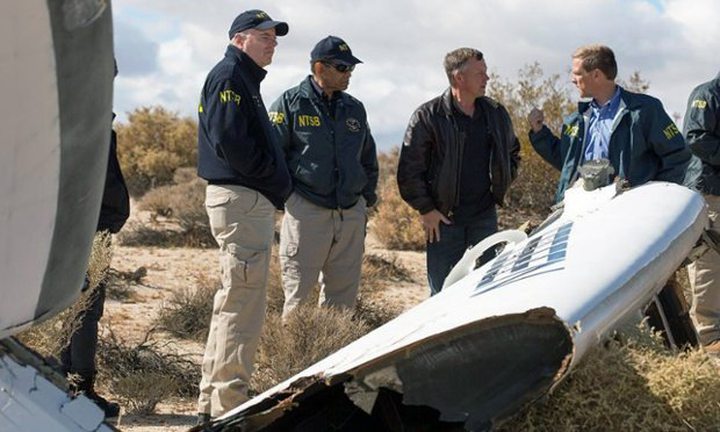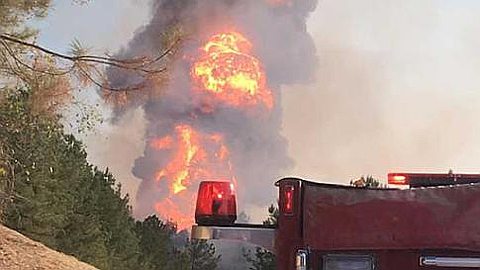Some Virgin Galactic Seatholders Ask for Refund on Tickets After Crash

One of the main unknowns behind the accident is what prompted the co-pilot to unlock the plane’s ...
Virgin Galactic has revealed that about 20 of the 700 customers who have paid up to £150,000 a head to reserve seats on the space tourism venture’s first flights have asked for their money back.
After Friday night’s fatal test flight, which killed one pilot and left the other seriously injured in hospital, about 3% of Virgin Galactic’s customers had cancelled, a spokesperson for Sir Richard Branson’s space project confirmed. The company has collected about £50m in deposits.
Virgin Galactic declined to disclose which customers had torn up their tickets, but the waiting list includes household names from scientist Stephen Hawking to performers Lady Gaga and Justin Bieber, and Hollywood couple Brad Pitt and Angelina Jolie.
The cancellations came as investigators revealed Virgin Galactic’s SpaceShipTwo plane broke apart only 13 seconds after its rocket engine fired up. They have released the first detailed timeline for the test flight, which ended in disaster when the wings were ripped off the fuselage of SpaceShipTwo seconds after its novel aerobraking system was deployed prematurely.
The space plane was released from its carrier aircraft about 45,000 feet over the Mojave desert in California at 10.07 and 19 seconds local time. Two seconds later, SpaceShipTwo’s rocket engine ignited. At 10.07 and 29 seconds, the space plane was approaching the sound barrier at Mach 0.94, and had punched through, reaching Mach 1.02 at 10.07 and 31 seconds.
The space plane was passing through the sound barrier when Michael Alsbury, the co-pilot, who was killed in the accident, unlocked the aerobraking system early.
In an update on Tuesday , investigators with the National Transportation Safety Board (NTSB) said the braking system should not have been unlocked until the space plane reached the faster speed of Mach 1.4. Even when unlocked, the aerobrake should not have come on until either pilot operated another lever, but one theory is that aerodynamic forces pushed the braking system into position almost immediately.
At Mach 1.4m the space plane would have been higher and in thinner air, but when the brake deployed, it was lower, down where the air is thicker, and the stresses on the brake would have been more violent.
At 10.07 and 34 seconds, the plane was torn apart and all contact lost.
SpaceShipTwo uses a novel “feathering system” to cut its speed and steady itself on re-entry to Earth’s atmosphere. When the brake is operated, twin tailbooms with fins that extend from the back of the space plane in normal flight swing upwards and forwards to increase drag. The move is intended to make the space plane fall like a shuttlecock until it reaches 70,000 feet, when the tailbooms return to normal position and the plane glides the rest of the way down.
One of the main unknowns behind the accident is what prompted the co-pilot to unlock the feathering system early. The question is one that a newly established NTSB “human performance group” will focus on.
Christopher Hart, acting chairman of the NTSB, said the group would investigate the “human-system interface”, or the controls, displays, and checklists for actions that pilots depend on to fly the space plane. Their work should establish whether the dials showed the right readings, or whether some other action led the co-pilot to try and deploy the aerobrake early.
Other investigators will check whether the space plane systems were operating properly at the time of the crash. “We’re beginning a check of the systems in the spacecraft for integrity and to verify normal operations, such as the environmental control system, the pneumatic system, the electrical system, and flight control systems,” Hart said. The investigation will establish all the facts that led to the tragedy and then move into an analysis phase to piece together the probable cause of the accident and make recommendations to avoid future accidents. The whole process could take a year to complete.
Most of the wreckage from the space plane fell over an 8km stretch of desert, but some smaller and lighter pieces of debris had been found as far as 56km away. The largest piece of the space plane is a fuselage wing piece, which must be cut into smaller pieces before it can be recovered to a hangar for inspection.
The NTSB has interviewed several eye witnesses, but has yet to gain permission to interview the pilot, Peter Siebold, who managed to parachute from the space plane and is being treated in a local hospital for injuries. “We will work with his medical care and family to arrange that when he’s ready,” Hart said.





